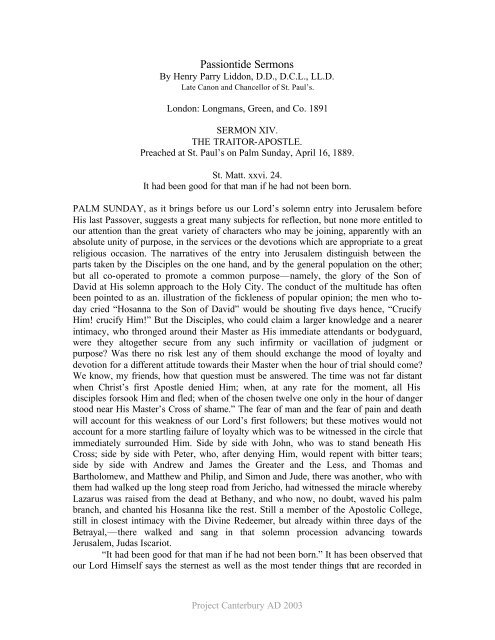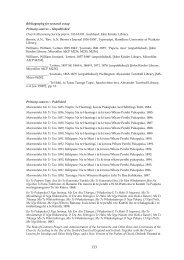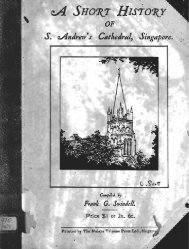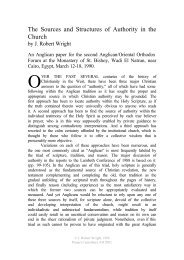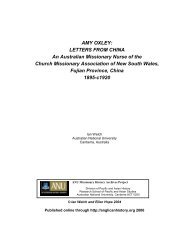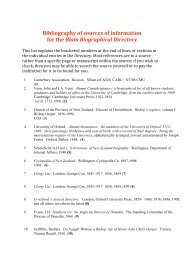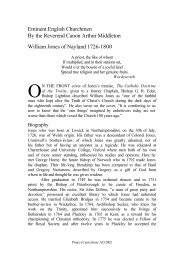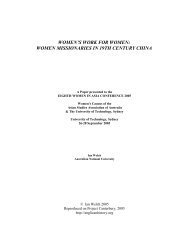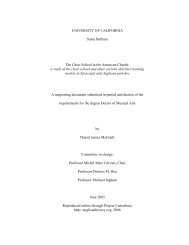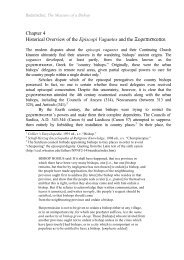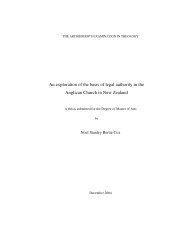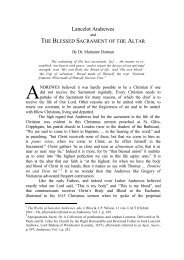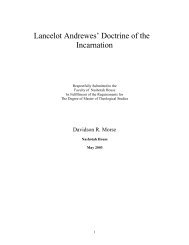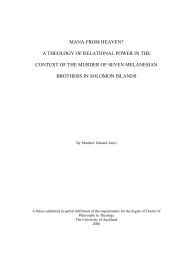Sermon 14 - Project Canterbury
Sermon 14 - Project Canterbury
Sermon 14 - Project Canterbury
You also want an ePaper? Increase the reach of your titles
YUMPU automatically turns print PDFs into web optimized ePapers that Google loves.
Passiontide <strong>Sermon</strong>s<br />
By Henry Parry Liddon, D.D., D.C.L., LL.D.<br />
Late Canon and Chancellor of St. Paul’s.<br />
London: Longmans, Green, and Co. 1891<br />
SERMON XIV.<br />
THE TRAITOR-APOSTLE.<br />
Preached at St. Paul’s on Palm Sunday, April 16, 1889.<br />
St. Matt. xxvi. 24.<br />
It had been good for that man if he had not been born.<br />
PALM SUNDAY, as it brings before us our Lord’s solemn entry into Jerusalem before<br />
His last Passover, suggests a great many subjects for reflection, but none more entitled to<br />
our attention than the great variety of characters who may be joining, apparently with an<br />
absolute unity of purpose, in the services or the devotions which are appropriate to a great<br />
religious occasion. The narratives of the entry into Jerusalem distinguish between the<br />
parts taken by the Disciples on the one hand, and by the general population on the other;<br />
but all co-operated to promote a common purpose—namely, the glory of the Son of<br />
David at His solemn approach to the Holy City. The conduct of the multitude has often<br />
been pointed to as an. illustration of the fickleness of popular opinion; the men who today<br />
cried “Hosanna to the Son of David” would be shouting five days hence, “Crucify<br />
Him! crucify Him!” But the Disciples, who could claim a larger knowledge and a nearer<br />
intimacy, who thronged around their Master as His immediate attendants or bodyguard,<br />
were they altogether secure from any such infirmity or vacillation of judgment or<br />
purpose? Was there no risk lest any of them should exchange the mood of loyalty and<br />
devotion for a different attitude towards their Master when the hour of trial should come?<br />
We know, my friends, how that question must be answered. The time was not far distant<br />
when Christ’s first Apostle denied Him; when, at any rate for the moment, all His<br />
disciples forsook Him and fled; when of the chosen twelve one only in the hour of danger<br />
stood near His Master’s Cross of shame.” The fear of man and the fear of pain and death<br />
will account for this weakness of our Lord’s first followers; but these motives would not<br />
account for a more startling failure of loyalty which was to be witnessed in the circle that<br />
immediately surrounded Him. Side by side with John, who was to stand beneath His<br />
Cross; side by side with Peter, who, after denying Him, would repent with bitter tears;<br />
side by side with Andrew and James the Greater and the Less, and Thomas and<br />
Bartholomew, and Matthew and Philip, and Simon and Jude, there was another, who with<br />
them had walked up the long steep road from Jericho, had witnessed the miracle whereby<br />
Lazarus was raised from the dead at Bethany, and who now, no doubt, waved his palm<br />
branch, and chanted his Hosanna like the rest. Still a member of the Apostolic College,<br />
still in closest intimacy with the Divine Redeemer, but already within three days of the<br />
Betrayal,—there walked and sang in that solemn procession advancing towards<br />
Jerusalem, Judas Iscariot.<br />
“It had been good for that man if he had not been born.” It has been observed that<br />
our Lord Himself says the sternest as well as the most tender things that are recorded in<br />
<strong>Project</strong> <strong>Canterbury</strong> AD 2003
Passiontide <strong>Sermon</strong>s, by H.P. Liddon<br />
the Gospel. He would not bequeath to a disciple the responsibility or the odium of<br />
proclaiming truths against which human nature, conscious of its real condition, will<br />
always rebel. He did not leave it to an Apostle to announce the unrepentant sinner’s<br />
doom. And He described the moral characteristics of men and classes and populations<br />
who came before Him during His ministry. Chorazin and Bethsaida, though on the sacred<br />
soil of Palestine, were, He said, in a worse case than the Pagan cities of Tyre and Sidon.<br />
Capernaum, though exalted unto heaven, would be cast down to hell. The Scribes and<br />
Pharisees, though sitting in the seat of Moses, were “fools,” “hypocrites,” “whited<br />
sepulchres.” Herod on his throne was yet a “fox.” But nothing that our Lord ever said of<br />
any class of men, or any one human being, approached in its severity this saying about<br />
Judas.<br />
They were sitting, He and the Disciples, at the Paschal meal, as the twilight was<br />
deepening towards the night. They ate almost in silence; scarce a word was spoken that<br />
was not necessary to the ceremony. Suddenly He broke in on the stillness with a saying<br />
which carried dismay to the hearts of all present: “One of you shall betray Me.” Each,<br />
even the most sincere, must have feared lest he should be capable of committing the<br />
unparalleled sin. Each was to feel for a moment his liability to a crime of which another<br />
might be guilty. Each by his question, “Lord, is it I?” implied withal his consciousness of<br />
innocence. Then our Lord proceeded to declare solemnly His approaching self-sacrifice,<br />
and the agency by which it would be brought about. He answered and said, “He that<br />
dippeth his hand with Me in the dish, the same shall betray Me. The Son of Man goeth as<br />
it is written of Him; but woe unto that man by whom the Son of Man is betrayed! it had<br />
been good for that man if he had not been born. Then Judas, which betrayed Him,<br />
answered and said, Master, is it I? He saith unto him, Thou hast said.”<br />
Concerning no other human being is so stern an utterance on Divine authority<br />
placed on record. It cannot be explained—against the whole drift of the passage—as<br />
though our Lord meant that it would have been good for Himself if Judas had not been<br />
born: nor yet as a proverbial saying which should not be taken too literally, since this is to<br />
mistake the profound seriousness of purpose with which our Lord used the gift of human<br />
speech. Nor does it merely predict that Judas, like such servants of God as Jeremiah or<br />
Job, would in a moment of transient despondency curse the day of his birth, since Jesus<br />
Himself confirms and utters this judgment of the despairing Judas; it is the Most Merciful<br />
Himself Who says, “It were good for that man if he had not been born.” As we think over<br />
the piercing words, we see how they close for ever the door of hope: since, if in some<br />
remotely distant age there were in store for Judas a restoration of his being to light and<br />
peace, beyond that restoration there would still be an eternity, and the balance of good<br />
would preponderate immeasurably on the side of having been born. It must be good for<br />
every human being to thank God for his creation,—for the opportunity of knowing and<br />
loving the Author of his existence,—unless such love and knowledge has been made, by<br />
his own act, for ever impossible.<br />
Now, first of all, observe that there are sayings about Judas which might seem to<br />
imply that his part in life was forced on him by an inexorable destiny. St. John says that<br />
Jesus knew from the beginning who should betray Him. Our Lord asked the assembled<br />
Apostles: “Have not I chosen you twelve, and one of you is a devil?” In His great<br />
Intercession, He thus addresses the Father: “Those that Thou gavest Me I have kept; and<br />
none of them is lost, save the son of perdition.” And at the election of Matthias, St. Peter<br />
[2]
Passiontide <strong>Sermon</strong>s, by H.P. Liddon<br />
points to the destiny of Judas as marked out in prophecy: “His bishoprick let another<br />
take:” and he speaks of Judas as going to his “own place.” This and other language of the<br />
kind has been understood to represent Judas as unable to avoid his part as the Betrayer:<br />
and the sympathy and compassion which is thus created for him is likely to blind us to a<br />
true view of his unhappy career.<br />
The truth is that at different times the Bible looks at human lives from two very<br />
different and, indeed, opposite points of view. Sometimes it regards men merely as<br />
factors in the Divine plan for governing the world—for bringing about results determined<br />
on by the Divine Wisdom; and when this is the case, it speaks of them as though they had<br />
no personal choice or control of their destiny, and were only counters or instruments in<br />
the Hand of the Mighty Ruler of the Universe. At other times Holy Scripture regards men<br />
as free agents, endowed with a choice between truth and error, between right and wrong,<br />
between a higher and a lower line of conduct: and then it enables us to trace the<br />
connection between the use they make of their opportunities and their final destiny. Both<br />
ways of looking at life are of course strictly accurate. On the one hand, it belongs to the<br />
sovereignty of the Almighty and Eternal Being, that we, His creatures, should be but<br />
tools in His Hands: on the other, it befits His Justice that no moral being, on probation,<br />
should suffer eternal loss save through his own act and choice. The language of Scripture<br />
about Pharaoh illustrates the two points of view. At one time we are told that the Lord<br />
hardened Pharaoh’s heart, that he would not let the Children of Israel go; at another, that<br />
Pharaoh hardened his own heart. The same fact is looked at, first from the point of view<br />
of what was needed in order to bring about the deliverance of Israel; and next from the<br />
point of view of Pharaoh’s personal responsibility. St. Paul stands at one point of view in<br />
the ninth chapter of his Epistle to the Romans, and at another in the twelfth. It is no doubt<br />
difficult, if not impossible, with our present limited range of knowledge, to reconcile the<br />
Divine Sovereignty in the moral world with the moral freedom of each individual man.<br />
Some of the great mistakes in Christian theology are due to an impatience of this<br />
difficulty. Calvin would sacrifice man’s freedom to the Sovereignty of God; Arminius<br />
would sacrifice God’s Sovereignty to the assertion of man’s freedom. We cannot hope<br />
here to discover the formula which combines the two parallel lines of truth, which meet<br />
somewhere in the Infinite beyond our point of vision: but we must hold last to each<br />
separately, in spite of the apparent contradiction. If our Lord, looking down upon our life<br />
with His Divine Intelligence, speaks of Judas, once and again, as an instrument whereby<br />
the Redemption of the world was to be worked out, the Gospel history also supplies us<br />
with materials which go to show that Judas had his freedom of choice, his opportunities,<br />
his warnings, and that lie became the Betrayer because he chose to do so.<br />
Secondly, Judas’s career illustrates the power of a single passion to enwrap, enchain,<br />
possess, degrade, a man’s whole character.<br />
The most Christian poet of our day contrasts the bliss of the Mother of the<br />
Redeemer with the sad lot of the mother of Judas—<br />
“Sure us to Blessed Mary come<br />
The Saints’ and Martyrs’ host.<br />
II.<br />
[3]
Passiontide <strong>Sermon</strong>s, by H.P. Liddon<br />
To own, with many a thankful strain.<br />
The channel of undying bliss.<br />
The bosom where the Lord hath lain,<br />
The hand that held by His;<br />
Sure as her form for evermore<br />
The glory and the joy shall wear,<br />
That robed her, bending to adore<br />
The Babe her chaste womb bare;—<br />
So surely throes unblest have been,<br />
And cradles where no kindly star<br />
Look’d down,—no Angel’s eye serene<br />
To gleam through years afar.”<br />
Then he tells how<br />
“Christ’s Mother mild<br />
Upon that bosom pitying thought,<br />
Where Judas lay, a harmless child,<br />
By gold as yet unbought.”<br />
Judas, we must suppose, had his good points, or he would never have become, by<br />
his own act, a disciple of our Lord Jesus Christ. He was no t in the position of those of us<br />
who are born of Christian parents, and are by Baptism made members of Christ in their<br />
infancy, without being consulted. He chose to follow our Lord, when to follow Him<br />
implied no gain or credit, and at least some risk of unpopularity or danger. This would<br />
seem to show that he must have had some eye for, or capacity of, understanding<br />
excellence; that he must have had some pleasure in associating with the good; that he<br />
cannot, at any rate at one time in his life, have been wanting in moral courage, selfdenial,<br />
and a spirit of enterprise for public religious objects.<br />
Judas had one vice or passion—the love of money, carried to a point which filled<br />
his thoughts and controlled the action of his will. When this propensity first showed itself<br />
we do not know: the germ of it may have been already lodged in his soul when he left his<br />
home to follow our Lord Jesus Christ. Certainly he had at first no opportunities for<br />
indulging it. Those great operations of modern finance, by which thousands, or even<br />
millions of money are transferred from hand to hand, or from one great firm to another,<br />
never, it need not be said, flitted before the imagination of this Galilæan peasant; nay,<br />
when he first became an Apostle, the rules under which the Twelve set to work forbade<br />
their providing gold or silver or brass in their purses, or scrip for their journey. At a<br />
somewhat later period, when our Lord was joined by Joanna the wife of Chuza, Herod’s<br />
steward, Susanna, and others, who ministered to Him of their substance, a common fund<br />
would seem to have been formed, and, either because he was thought to have natural<br />
aptitudes fur the work, or because he desired it, Judas became the treasurer; he had the<br />
bag. That bag contained, probably, at most a few of the small copper coins that were<br />
struck by the Roman procurators or by the Herods. But the magnitude of any passion in<br />
the human soul is altogether independent of the limits of its opportunity for indulgence.<br />
Tyranny is as possible in a cottage as on an Eastern throne; though it may have to content<br />
itself with more restricted gratification. Envy, pride, sensuality, maliciousness, though<br />
[4]
Passiontide <strong>Sermon</strong>s, by H.P. Liddon<br />
they may be gratified on a vast area, and with terrific results to millions, or within the<br />
narrowest limits of a very humble lot, are, as passions, in the one case what they are in<br />
the other—powers that overshadow and gradually absorb all else in the soul, and give it<br />
throughout the impress and colour of their own malignity. Just as there are bodily<br />
diseases, which, at first unobtrusive and unnoticed, and capable of being extirpated if<br />
taken in time, will spread and grow until first one and then another limb or organ is<br />
weakened or infected by them, so that at last the whole body is but a habitation for the<br />
disease which is hurrying it to the grave; so in the moral world one unresisted propensity<br />
to known wrong may in time acquire a tyrannical ascendency that will make almost any<br />
crime possible in order to gratify it.<br />
It is a neglect of this truth—a truth which may be verified by a very little<br />
observation of human nature—that has led some modern writers to attempt a revision of<br />
the account of the character of Judas which is set before us in Holy Scripture. They think<br />
that that account does not explain so tremendous a fall: that the real reasons for it must<br />
have been graver, or more numerous, or more complex; that it was profound insincerity<br />
from the first; or envy of the moral superiority of Jesus; or resentment secretly cherished<br />
for some warning, or rebuke, or fancied neglect; or even a seeming attachment to the<br />
Jewish priesthood, to the Scribes and Pharisees, to the orders of men who were prominent<br />
in the old religious life of the country. If it was so, it must be a matter of conjecture: Holy<br />
Scripture does not say so. If it was so, we may be sure that the ruling passion gradually<br />
enlisted these other motives; drew them up into and assimilated them with itself, like the<br />
raw levies of subject states, which a conqueror incorporates with his own disciplined<br />
forces. Judas was at bottom, and before all, a man who cared for money more than he<br />
cared for conscience, or for virtue, or for God; and it was this fatal propensity which,<br />
with or without other contributing causes, but at any rate in the first instance, determined<br />
his ruin.<br />
We see this motive in full energy when Mary anointed our Lord’s Feet at<br />
Bethany. Judas could see in her action no ray of the love which made it so beautiful. He<br />
had only one thought,—the money’s worth of the box of ointment.<br />
It might have been sold, he said, for three hundred silver pence and given to the<br />
poor. Covetousness will often give itself the airs of a far-sighted philanthropy, which<br />
protests against the waste of money on what it describes as mere sentiment. Our Lord did<br />
not note the fact that Judas was dishonest, and would have had the price of the ointment<br />
in his keeping had it been sold. He only observed that Judas would have other<br />
opportunities for befriending the poor, and that Mary had used her one opportunity of<br />
doing honour to His Burial by anticipation. But Judas understood the rebuke; and no<br />
doubt it quickened the determination he had already formed. If he could not have the<br />
three hundred silver denarii, he at least might have thirty shekels, about one-fifth of it;<br />
and his revenge for the scene at Bethany into the bargain.<br />
III.<br />
Thirdly, the history of Judas shows us that great religious privileges do not of themselves<br />
secure any man against utter spiritual ruin. It would, of course, be ingratitude to God to<br />
deny that such privileges may and should further our highest interests. But religious<br />
privileges only do their intended work when they are responded to on our part by the<br />
[5]
Passiontide <strong>Sermon</strong>s, by H.P. Liddon<br />
dispositions which can appropriate and make the most of them; by sincerity of purpose,<br />
by a humble, that is to say a true, estimate of self, by sorrow for past sin, by<br />
watchfulness, by an especial care not to let any one acquire that preponderant and<br />
supreme place in the soul which may render all helps to holiness useless, and may forfeit<br />
all prospect of eternal peace.<br />
What religious opportunities could be greater than those which were enjoyed by<br />
Judas Iscariot? lie was one of those twelve men who were most closely associated with<br />
the Redeemer of the world during His Ministry. He was admitted to an intimacy which<br />
was denied to those of our Lord’s first-cousins, “brethren,” as they are called, who were<br />
not already Apostles; nay, which, when His Ministry had once begun, was denied to His<br />
Blessed Mother. Judas shared a Companionship compared with which the purest and<br />
noblest intimacies that this earth has known were worthless and degrading. He heard the<br />
very Words, he witnessed the very Works, which are recorded in the Gospels. He heard<br />
and witnessed many more which have not been recorded. He received upon his<br />
understanding and his memory, if not within his heart, the impress of that one<br />
incomparable Life revealing itself insensibly, incessantly, by a thousand rays of Charity<br />
and Wisdom playing all around it.<br />
How often may we have heard men say, “If I had not to live among the<br />
degenerate and inconsistent Christians whom I see around me, if I had lived eighteen<br />
hundred years ago with Jesus of Nazareth in His own Galilee, I should be a better man<br />
than I am.” But is it more certain that this would be so than that the brethren of Dives,<br />
who heard not Moses and the prophets, would have been persuaded by one rising from<br />
the dead? If anything could have roused a man lo a sense of moral danger we might think<br />
that the teaching of Jesus Christ, to which Judas listened, would have done so. Judas must<br />
have heard our Lord’s warnings about the guilt of unfaithfulness in the “unrighteous<br />
mammon.” Judas would have listened to the Parable of the Sower, and the explanation<br />
how the cares of this world, and the deceitfulness of riches, choke the Word of Truth in<br />
the soil of the soul. Judas may well have thought that the saying, “Ye cannot serve God<br />
and mammon;” or the proverb, “It is easier for a camel to go through the eye of a needle<br />
than for a rich man to enter into the kingdom of heaven,” were meant for him. Judas was<br />
even one of those who asked the question with regard to this proverb, “Who then can be<br />
saved?” But the very greatest religious advantages do not compel the understanding to be<br />
sincere, or the conscience to be sensitive, or the affections to be warm and quick, or the<br />
will to be straightforward and vigorous. Judas lived in the closest intimacy with Jesus;<br />
but this intimate relation with Jesus did not save Judas from a crime compared with<br />
which that of the Jewish rabble, and the Roman soldiers, and Pontius Pilate, and the Chief<br />
Priests and Pharisees, was venial:—it did not save him from becoming the betrayer.<br />
Surely this is a most serious consideration for those who are already, by God’s<br />
great goodness and mercy, privileged to know much of religious truth, and to have much<br />
to do with the duties and privileges that more especially belong to Religion. Especially,<br />
as I would remind myself, does it concern us of the clergy, who are necessarily associated<br />
more closely than other men with the works, the advantages, and the truths that belong to<br />
Religion; who have to use the language of Religion; and who may too easily assume that<br />
this of itself implies an immunity from moral and spiritual disaster, that is by no means<br />
assured to us. Who does not know, or may not easily discover, that this necessary<br />
familiarity with holy things has dangers which are peculiarly its own; that it may easily<br />
[6]
Passiontide <strong>Sermon</strong>s, by H.P. Liddon<br />
foster a mechanical and formal temper which robs language of its sincerity, and prayer of<br />
its power and efficacy, and a man’s inner life of the strong and pure motives that alone<br />
ennoble it; that, unless there be great watchfulness over what is going on within, as well<br />
as care to do and say sincerely what has to be said and done in the way of outward duty,<br />
almost any measure of spiritual ruin is only too possible? And what is true of clergymen<br />
is true of all who have knowledge of and contact with the things of Religion. To be close<br />
to Jesus Christ may be to be as St. John; but it may be to be as Judas. Let us, one and all,<br />
not be high-minded, but fear.<br />
If any one, whose business it may have been to study the infidel literature of our<br />
day, should set himself to inquire whence have come the most intelligently bitter and<br />
deadly thrusts at the power and work of our Divine Master, he will not, I think, find that<br />
they proceed from the layman, who has perhaps known nothing of religion in his early<br />
years, and has been kept throughout life by a thick integument of prejudice from making<br />
any real acquaintance with it in his later life. No! rather will they be found to come from<br />
men who have been trained, or even cradled, amid sacred associations: from the teacher<br />
in a Christian school; from the seminarist who was looking forward to Ordination; from<br />
the Divinity student who was destined to occupy, or who already occupied, a professor’s<br />
chair; from the companions and associates of those who have had most to do with<br />
kindling among their contemporaries the sacred flame of religious conviction.<br />
In order to betray religion effectively, a man must have been, in some sense,<br />
intrusted with it: he must have explored and shared its sacred secrets; he must not only<br />
have studied it from afar; he must have taken it to his heart. Everybody does not know<br />
enough to be a Judas—enough to pierce religion in the part which, to the common<br />
apprehension, shall seem to be most vulnerable, or where the sensitiveness of Christian<br />
faith will be most deeply pained. Every one does not know enough to be sure where Jesus<br />
will be found after dark,—under the olive-trees in the Garden; enough to lead a rude<br />
company of followers, all of them indignant, but most of them uninformed, down across<br />
the steep valley of Jehoshaphat, and up again to the gate of Gethsemane, and then to go<br />
straight to the Object of their search, without hesitation or error, and utter the “Hail,<br />
Master” which is to show them their intended Victim.<br />
Observe, too, in the betrayal of our Lord, the survival of religious habit when the<br />
convictions and feelings which make Religion real have passed away. Judas betrayed the<br />
Son of Man with a kiss. The kiss was a customary expression of mingled affection and<br />
reverence on the part of the disciples when meeting their Master.<br />
To suppose that Judas deliberately selected au action which was as remote as<br />
possible from his true feelings is an unnecessary supposition. It is more true to human<br />
nature to suppose that he endeavoured to appease whatever there may have been in the<br />
way of lingering protest in his conscience, by an act of formal reverence, that was<br />
dictated to him by long habit, and that served to veil from himself the full enormity of his<br />
crime at the moment of his committing it. In like manner, brigands in the south of Europe<br />
have been known to accompany deeds of theft, and even murder, with profuse<br />
ejaculations, whether of piety or superstition: and cases have been known further north of<br />
picking pockets when the thief and his victim were kneeling or sitting side by side in a<br />
Church or meeting-house. In these instances Religion may be employed, not simply as a<br />
blind to an immoral act, but as a salve to a protesting conscience; the passing thrill of<br />
emotion seems to do something towards reducing the magnitude of the crime which<br />
[7]
Passiontide <strong>Sermon</strong>s, by H.P. Liddon<br />
accompanies it.<br />
The kiss of Judas! It has become a proverb for all those procedures whereby,<br />
under the semblance of outward deference for Religion, or of devotion to its interests, its<br />
substance and reality are sacrificed or betrayed. The general conscience of mankind is<br />
still too alive to the importance of basing human life on sanctions that are drawn from a<br />
higher world, to welcome, or even to permit, attacks upon all Religion, on the ground of<br />
avowed hostility to it. Accordingly, its opponents generally assume some garb of<br />
discipleship: they commonly profess an interest in it to which its ordinary professors or<br />
defenders are strangers: if they attack its doctrine, they are only anxious to remove what<br />
they conceive to be excrescences, and to restore in its purity some creed which they<br />
attribute to the earliest times: if they assail its discipline, it is in the interests of some<br />
theory of personal liberty which they would have us believe is essentially bound up with<br />
real piety; if they would confiscate its material revenues to some secular purposes, they<br />
assure us that what they really have at heart is the restoration of the Church to a condition<br />
which shall satisfy their ideal of apostolical poverty.<br />
A religious reason is generally produced for the abandonment of any interest,<br />
truth, or duty of religion. Eternal Punishment is set aside out of anxiety to assert God’s<br />
Mercy: the Pardon of penitent sinners from devotion to His strict Justice: Sacraments are<br />
depreciated under cover of our profession of lofty spirituality: practical energy is decried<br />
for the honour of some doctrine, certainly not St. Paul’s, of Justification by Faith.<br />
Something of the nature of a kiss is required by public opinion in Christendom in order to<br />
disguise the process of delivering Jesus to His would-be murderers: so that even the most<br />
extreme forms of infidelity find it necessary to preface an assault upon fundamental truth,<br />
of vital import to the very heart and life of religion, by an expression of concern for a<br />
very transcendental essence of religion which is to survive, and indeed to profit by, the<br />
rejection of the particular truth which is being assailed.<br />
But this affectation of interest in religion on the part of its opponents belongs only<br />
to particular phases of public opinion. The professed friends of Jesus are always in<br />
danger of betraying Him. The Scribes and Pharisees, the Roman soldiers, Pilate and<br />
Herod, could apprehend, insult, torture, condemn, crucify our Lord; but they could not<br />
betray Him. For this it was necessary to be more or less in His confidence. We Christians<br />
can do Him a more deadly injury than can any who know Him not, and have no part in<br />
Him.<br />
Let us put each before himself the misery that it will be if He, Who made us for<br />
Himself, and Who redeemed us and sanctified us, that we might be His in time and in<br />
Eternity, should pronounce any of us, for such a reason as this, to be one who had better<br />
not have been born. Let us reflect that it is not impossible for us to incur the sentence<br />
which was uttered over the fallen Apostle by the Most Merciful. We may be nearer acting<br />
the traitor’s part than, in our security, we think: the outward signs of the gravest effects in<br />
the spiritual world are, like the kiss of Judas, often insignificant enough: a word, a smile,<br />
a slight act performed or omitted, even a shrug of the shoulders, may leave on another<br />
spirit an impression that will last throughout Eternity. And if we would escape this<br />
misery let us do one thing,—aim at, long for, pray for, a single aim in the service of God.<br />
St. Bernard used often to ask himself the question which our Lord put to Judas, “Friend,<br />
wherefore art thou come?” Why hast thou been created and placed in this world at all?<br />
why hast thou been made a member of Christ in Baptism? why hast thou been led by<br />
[8]
Passiontide <strong>Sermon</strong>s, by H.P. Liddon<br />
Providence to this or that state of life? Art thou here to do thy own will; to live without<br />
obeying any above thee; or wouldst thou indeed serve God, and by labour and suffering<br />
prepare for His Everlasting Presence? “Friend, wherefore art thou come?” If we would<br />
sincerely press that question home, how different might be the aim and the perfectness of<br />
our work throughout each day; secular occupation, intercourse with others, prayers public<br />
and private, Communions,—all would receive a new elevation from the dread lest,<br />
through vanity, or insincerity, or worse, we should after all have our part with the traitor.<br />
And if we will often ask ourselves this question, it will make and keep us<br />
watchful over what is going on within our souls. Where this watchfulness is lacking,<br />
vices may spring up, and grow unobservedly, until they have eaten out love, moral force,<br />
spiritual beauty; leaving only the external semblance of what once was life, and biding<br />
their time for the occasion which, by one fatal crime, shall discover to the world and to<br />
the conscience itself the dread reality of an utterly perverse and apostate will. Nobody<br />
ever became very bad indeed all at once; and to grapple with tendencies to evil before<br />
they have had time to acquire the strength which can enlist the passions in their service,<br />
and make a home and empire within the soul, is indeed the part of Christian prudence.<br />
Let these words of our Redeemer, which fell to no purpose on the ear of Judas, sink deep<br />
into our souls; lest for us too His Precious Blood should have been shed in vain. “Try me,<br />
O God, and seek the ground of my heart: prove me, and examine my thoughts. Look well<br />
if there be any way of wickedness in me; and lead me in the way everlasting.”<br />
[9]


